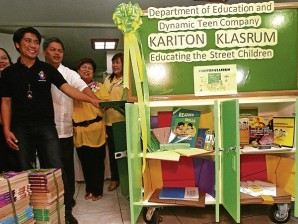
2009 CNN Hero of the Year Efren Peñaflorida Jr. (left), Education Secretary Armin Luistro and Social Work Secretary Dinky Soliman show to the media the “Kariton Klasrum” during its launching Saturday at the Department of Education. The mobile classroom will be rolled out on the streets of Metro Manila soon to help out-of-school youths. RAFFY LERMA
Rolling out soon on Metro Manila’s streets: the new and improved “Kariton Klasrum.”
Taking the lead of a global hero, the Department of Education (DepEd) on Saturday launched an alternative learning program to reach out to street children, adopting the pushcart learning system of 2009 CNN Hero Efren Peñaflorida.
DepEd and Peñaflorida’s Dynamic Team Company (DTC), with the help of local government units, the social welfare department, barangay (village) officials and the police, will bring the Kariton Klasrum to Metro Manila to bring a six-month basic literacy program to street children aged 5 to 15.
“The goal of the Kariton Klasrum is not replace formal schooling but to help kids on the streets who have shied away from school because of poverty, lack of interest in studying, and negative elements in their surroundings,” Peñaflorida said at the launch at the DepEd Central Office in Pasig City.
“The Kariton Klasrum is here to encourage the street children to go back to formal education,” he said.
Called K4, or “Kariton, Klasrum, Klinik, Kantin,” the program aims to bring a holistic learning experience for those who cannot go to school through providing an alternative classroom, healthcare and feeding.
Scaling up the program Peñaflorida initiated in his native Cavite City several years back, DepEd will roll out this month four kariton classrooms in the cities of Manila, Pasig, Caloocan and Quezon City, targeting areas where street children are known to stay.
Government estimates place the number of Metro Manila’s street children at 5,000, but Luistro says “there could be more.”
Thirteen other pushcarts will later be brought to streets in other Metro Manila cities, said Education Secretary Armin Luistro.
Built and redesigned by DepEd’s engineering office, each kariton classroom will be stocked with first-aid kits from the Department of Health and books and other learning materials from DepEd.
DTC volunteers and trained teachers will take turns manning the kariton, said Luistro, taking to the streets with a special curriculum developed specifically for street children.
Basic lessons
“It starts where the kids are. These are basic lessons like how to take a bath, the proper way of eating. It’s really student-centered,” said Luistro in an interview.
Finishers may then take DepEd’s equivalency tests for their eventual and ideal enrollment in regular public schooling.
Luistro notes that while DepEd has existing programs for those out of school, state education has mainly been focused on providing for those in formal schools.
“DepEd’s mission is simple: To take care of the youth. But our focus has been mainly on children already in school. And the President (Aquino) always says we should also look at those who are left behind. They are those we hope to reach,” Luistro said in his speech.
While DepEd has yet to allocate a specific budget for the program, Luistro expressed confidence that funding will come even if “we don’t see it yet in the GAA [General Appropriations Act or the national budget].”
Social Welfare Secretary Dinky Soliman also said at the launch that her department will track street children to be enlisted in the Kariton Klasrum program and include them in the conditional cash transfer program.
Under the program, the poorest Filipino families are given regular state subsidy if they comply with certain requirements, including keeping their children in school and having regular medical checks at public health centers.